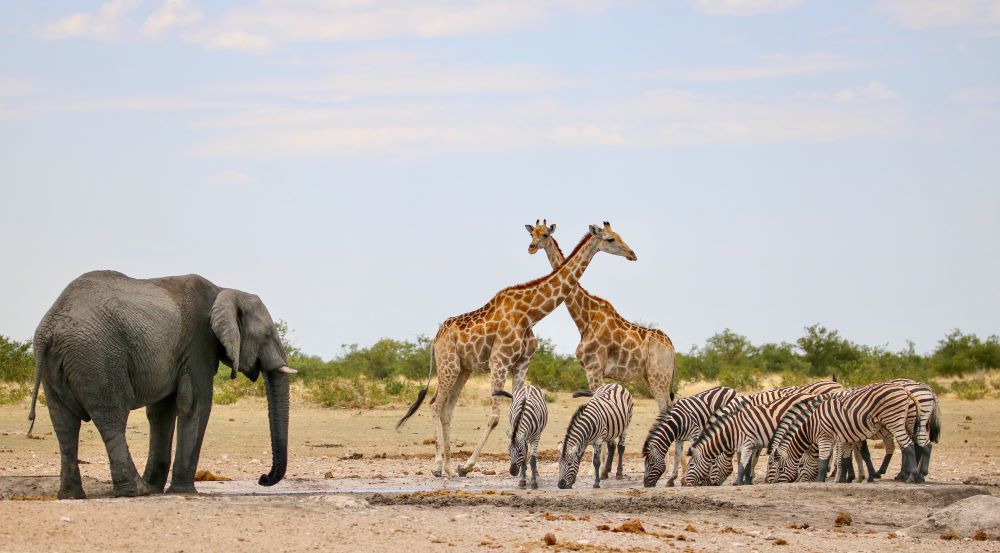NRI’s Professor of Ecology Steve Belmain is co-author of an influential paper recently published in the Nature journal, Scientific Data. The bii4africa dataset of faunal and floral population intactness estimates across Africa’s major land uses sheds light on threats to biodiversity from land use changes in sub-Saharan Africa. The article describes the process of developing scores representing the intactness of land-dwelling vertebrates and plants in sub-Saharan Africa across nine major land uses of varying intensity. The dataset was developed to enable the quantification of the Biodiversity Intactness Index (BII) for sub-Saharan Africa. A BII estimates how the average abundance of native land species in an area compares with their abundance before alteration by pronounced human activity.
To generate the bii4africa dataset, experts assessed data on approximately 5,400 vertebrates including mammals, amphibians, reptiles and birds, and roughly 45,000 plant species across major land uses such as cropland, rangeland and urban. The dataset provides an African-led alternative to a previous attempt to map the Biodiversity Intactness Index globally that produced inaccurate results for Africa.
 Rapid socio-economic development over the past century has significantly transformed ecosystems through human activities like urbanisation, infrastructure development, agriculture and resource extraction. However, current biodiversity datasets that could be utilised to evaluate the effects of human activities on biodiversity and the support system it provides, have key constraints impeding the integration of biodiversity considerations into policy and planning. For example, African policymakers have highlighted data limitations as a key barrier to integrating biodiversity into national sustainable development efforts.
Rapid socio-economic development over the past century has significantly transformed ecosystems through human activities like urbanisation, infrastructure development, agriculture and resource extraction. However, current biodiversity datasets that could be utilised to evaluate the effects of human activities on biodiversity and the support system it provides, have key constraints impeding the integration of biodiversity considerations into policy and planning. For example, African policymakers have highlighted data limitations as a key barrier to integrating biodiversity into national sustainable development efforts.
Among other limitations, the datasets are biased towards bigger, more conspicuous species like large mammals and birds. They are also biased towards North America and Europe, with Africa notably underrepresented, and towards more intact (undisturbed by human activity) land uses particularly protected areas. In addition, a robust assessment of human impacts on biodiversity requires that the current state of biodiversity is compared to a reference state. Such comparison necessitates that biodiversity data is collected using comparable approaches either across current human-modified and unmodified (intact) landscapes or over time, further limiting data availability.
The PREDICTS database, the largest global dataset of species population abundances across different land uses, epitomises such limitations. PREDICTS includes only 35 Afrotropical (including sub-Saharan Africa, the southern Arabian Peninsula, the island of Madagascar, and the islands of the western Indian Ocean) studies comparing population numbers between human-modified and intact reference locations. Such constraints can facilitate bias towards Global North solutions in international decision-making.
To address these limitations, experts in Afrotropical biodiversity on mainland sub-Saharan Africa estimated the ‘intactness scores’ in specific land uses to generate the bii4africa dataset. The intactness score is the remaining fraction of an ‘intact’ reference population of a given species in a particular land use. The ‘intact’ reference is the population abundance that would likely have existed in an area before modification by modern industrial society.
Professor Belmain said: ‘Africa is one of the world's most biodiverse continents. Many of its large charismatic species are locked away in game reserves and national parks to protect and conserve them. However, anthropocentric threats are increasing for all animals and plants, and we often still have a poor understanding of these threats and how to mitigate them. The bii4africa dataset should help enable strategies to foster human-wildlife co-existence, providing a key to mark conservation progress."
Crucially, the dataset, co-produced by 200 experts including Professor Belmain, embodies context-specific knowledge on African biodiversity, fostering inclusivity in ecology. It is also a positive response to the recent call by the Intergovernmental Science-Policy Platform on Biodiversity and Ecosystem Services (IPBES) for African-led research that closes knowledge gaps by mobilising local data.
This dataset was co-produced as part of the Biodiversity Intactness Index for Africa (bii4africa) Project. The dataset has multiple other uses including informing the International Union for Conservation of Nature (IUCN) Red List of Ecosystems, informing future research and training in African biodiversity and assessment of ecosystem conditions for national planning purposes.
Bii4africa is a collaborative project mobilising biodiversity knowledge from experts across Africa to facilitate the incorporation of biodiversity data into decision-making for just and sustainable development across Africa.
Read the open access paper here.
For more information: Professor Steve Belmain
Read the open access paper here. For more information: Professor Steve Belmain


